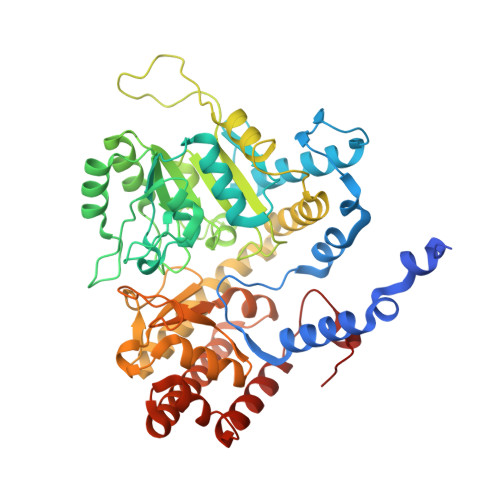Structural and functional analysis of two SHMT8 variants associated with soybean cyst nematode resistance.
Korasick, D.A., Owuocha, L.F., Kandoth, P.K., Tanner, J.J., Mitchum, M.G., Beamer, L.J.(2024) FEBS J 291: 323-337
- PubMed: 37811683
- DOI: https://doi.org/10.1111/febs.16971
- Primary Citation of Related Structures:
7UJH, 7UJI, 8DOM, 8DSK, 8FSD - PubMed Abstract:
Two amino acid variants in soybean serine hydroxymethyltransferase 8 (SHMT8) are associated with resistance to the soybean cyst nematode (SCN), a devastating agricultural pathogen with worldwide economic impacts on soybean production. SHMT8 is a cytoplasmic enzyme that catalyzes the pyridoxal 5-phosphate-dependent conversion of serine and tetrahydrofolate (THF) to glycine and 5,10-methylenetetrahydrofolate. A previous study of the P130R/N358Y double variant of SHMT8, identified in the SCN-resistant soybean cultivar (cv.) Forrest, showed profound impairment of folate binding affinity and reduced THF-dependent enzyme activity, relative to the highly active SHMT8 in cv. Essex, which is susceptible to SCN. Given the importance of SCN-resistance in soybean agriculture, we report here the biochemical and structural characterization of the P130R and N358Y single variants to elucidate their individual effects on soybean SHMT8. We find that both single variants have reduced THF-dependent catalytic activity relative to Essex SHMT8 (10- to 50-fold decrease in k cat /K m ) but are significantly more active than the P130R/N368Y double variant. The kinetic data also show that the single variants lack THF-substrate inhibition as found in Essex SHMT8, an observation with implications for regulation of the folate cycle. Five crystal structures of the P130R and N358Y variants in complex with various ligands (resolutions from 1.49 to 2.30??) reveal distinct structural impacts of the mutations and provide new insights into allosterism. Our results support the notion that the P130R/N358Y double variant in Forrest SHMT8 produces unique and unexpected effects on the enzyme, which cannot be easily predicted from the behavior of the individual variants.
Organizational Affiliation:
Department of Biochemistry, University of Missouri, Columbia, MO, USA.



















